人教版高一英语必修二unit2全套讲课教案
- 格式:pptx
- 大小:4.20 MB
- 文档页数:87
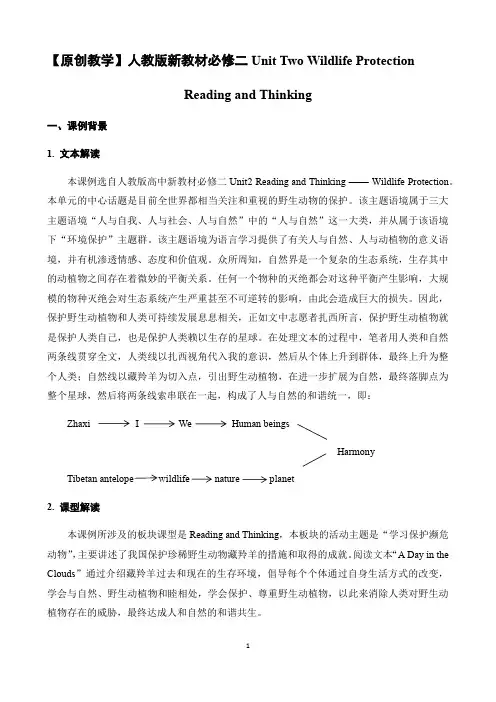
【原创教学】人教版新教材必修二Unit Two Wildlife ProtectionReading and Thinking一、课例背景1. 文本解读本课例选自人教版高中新教材必修二Unit2 Reading and Thinking —— Wildlife Protection。
本单元的中心话题是目前全世界都相当关注和重视的野生动物的保护。
该主题语境属于三大主题语境“人与自我、人与社会、人与自然”中的“人与自然”这一大类,并从属于该语境下“环境保护”主题群。
该主题语境为语言学习提供了有关人与自然、人与动植物的意义语境,并有机渗透情感、态度和价值观。
众所周知,自然界是一个复杂的生态系统,生存其中的动植物之间存在着微妙的平衡关系。
任何一个物种的灭绝都会对这种平衡产生影响,大规模的物种灭绝会对生态系统产生严重甚至不可逆转的影响,由此会造成巨大的损失。
因此,保护野生动植物和人类可持续发展息息相关,正如文中志愿者扎西所言,保护野生动植物就是保护人类自己,也是保护人类赖以生存的星球。
在处理文本的过程中,笔者用人类和自然两条线贯穿全文,人类线以扎西视角代入我的意识,然后从个体上升到群体,最终上升为整个人类;自然线以藏羚羊为切入点,引出野生动植物,在进一步扩展为自然,最终落脚点为整个星球,然后将两条线索串联在一起,构成了人与自然的和谐统一,即:Zhaxi I We Human beingsHarmonyTibetan antelope wildlife nature planet2. 课型解读本课例所涉及的板块课型是Reading and Thinking,本板块的活动主题是“学习保护濒危动物”,主要讲述了我国保护珍稀野生动物藏羚羊的措施和取得的成就。
阅读文本“A Day in the Clouds”通过介绍藏羚羊过去和现在的生存环境,倡导每个个体通过自身生活方式的改变,学会与自然、野生动植物和睦相处,学会保护、尊重野生动植物,以此来消除人类对野生动植物存在的威胁,最终达成人和自然的和谐共生。
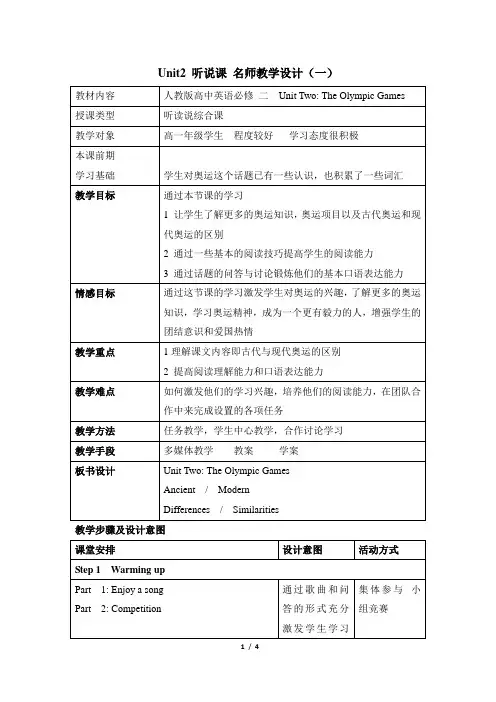
Unit2 听说课名师教学设计(一)教学步骤及设计意图教学过程:Step I . Warming upPart one : Enjoy a song : You and Me Part two: CompetitionAnswer the questions related to the Olympic games.1.Where did the ancient Olympic Games start?Olympia in Greece2. When and where did the modern Olympic Games start?Athens in 18963. What are the three words that show the spirit of the Olympic Games?swifterhigherstronger4. What do the five rings on the Olympic flag stand for?the five continents:Europe Africa America Asia OceaniaStep II ReadingPart one :Listen to the text to get the main idea of it.This interview is mainly about the similarities and differences between the ancient and modern OlympicsPart two: Skan the text to fill in the form about the similarities and differences between the ancient and modern OlympicsStep. III . SpeakingPart one :Role play : Make an interview to talk about some simple questions related to the Beijing Olympic Games. Sample:Interviewer A: Hi, LiYan. nice to meet you!LiYan: Nice to meet you too!Interviewer A: I'm … .I'm dying for some information about the Beijing Olympic Games, I know you were a volunteer .Can I ask you some questions?LiYan: Of course ,you can. What do you want to know?Interviewer A: …LiYan: …Interviewer A:LiYan:……Interviewer A:Thank you for telling me so much about the Beijing Olympic Games. LiYan: My pleasure.Part two :What do you think you should do to make our country more powerful and prosperous? Students will give various answers.Step Ⅳ:homeworkPreview the language points of AN INTERVIEW。
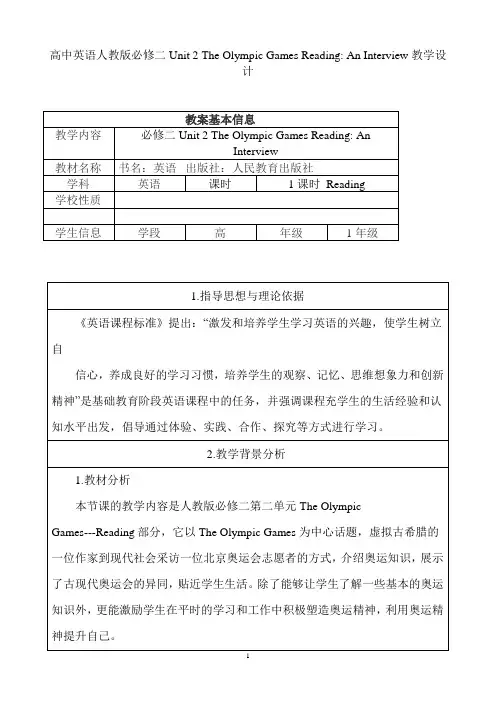
1. Every athlete can take part in the Olympic Games.2. The winter Olympics are usually held two years before the summer Olympics.3. There are many events like ice skating and volleyball in the winter Olympics.4. The Olympics were born in Greece.5. The Olympic Village is built for athletes to compete in.Step 4 Post-reading.阅读完全文,提取了一定量的奥运知识后,让学生完成一篇七选五阅读材料。
The ancient Olympic Games started in 776 BC and stopped in 393 AD. With time passing, the ancient Olympics have well developed and a completely new system of the present-day Olympics comes into being. 1.2. The event was only held in Greece and only men competitors were allowed to take part. Women could take part in chariot races (敞篷马车比赛) with horses but this was the only time they could join in.3. If they try to watch the games, they could be put to death. Because of the poor economy, there was no prize money but the olive wreath which awarded as an honor to the winners. Despite all the difficulties, ancient people still enjoyed the competition purely for their spiritual delight.Nowadays, people add more details to the Olympics. 4. The competition items are also extended, including gymnastics, swimming and sailing. What's more, the modern Olympics also give women the rights to compete for themselves. Although the Olympics are no longer what they used to be, the motto---"Swifter, Higher and Stronger"--- is never changed. In fact, the Olympics have become a worldwide festival,lighting up all the people's passion. 5.A. There are two main sets of Games --- the Winter and the Summer Olympics.B. Married women were not even allowed to watch the games.C. There was no Winter Olympic Games in the ancient Olympic Games.D. In the past, the Olympics were quite limited.E. Thanks to the Olympic Games, people's hearts beat as one.F. Women are not only allowed, but play a very important role.G. These changes are pretty good because the new one has a broader stage opento the whole human race.Step 5. Discussion结合时事,中国申请2022冬奥会成功之后全国一片欢呼,请展开创造性批判性思维,就“Will 2022 Beijing Winter Olympics do more good or do more在本节课上大多数学生都能积极的参与到学习活动中来,表现出了浓厚的学习兴趣,强烈的参与意识、合作意识、竞争意识、和效率意识,在老师的指导下,根据不同的学习任务临时的调整学习策略,通过课堂发言和小组活动的了解分析,我认为大多数学生已经较好的掌握了本节课的重点,能够掌握有关奥运会的相关知识,对古现代奥运会的异同有了进一步的了解。
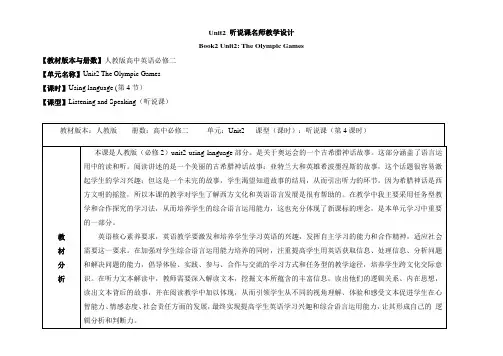
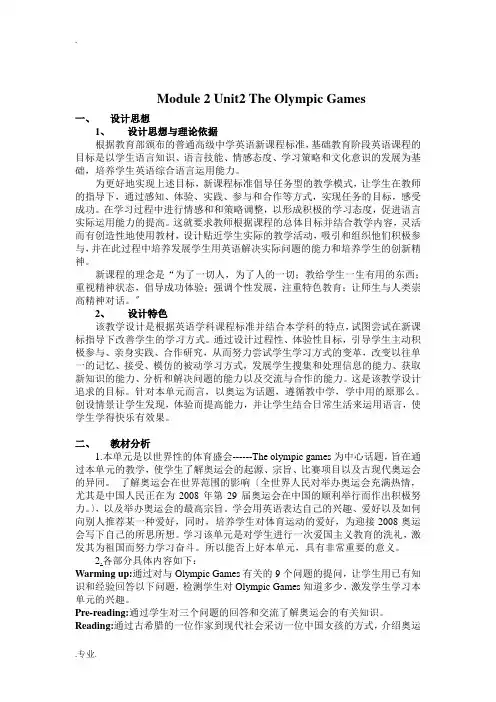
Module 2 Unit2 The Olympic Games一、设计思想1、设计思想与理论依据根据教育部颁布的普通高级中学英语新课程标准,基础教育阶段英语课程的目标是以学生语言知识、语言技能、情感态度、学习策略和文化意识的发展为基础,培养学生英语综合语言运用能力。
为更好地实现上述目标,新课程标准倡导任务型的教学模式,让学生在教师的指导下,通过感知、体验、实践、参与和合作等方式,实现任务的目标,感受成功。
在学习过程中进行情感和和策略调整,以形成积极的学习态度,促进语言实际运用能力的提高。
这就要求教师根据课程的总体目标并结合教学内容,灵活而有创造性地使用教材,设计贴近学生实际的教学活动,吸引和组织他们积极参与,并在此过程中培养发展学生用英语解决实际问题的能力和培养学生的创新精神。
新课程的理念是“为了一切人,为了人的一切;教给学生一生有用的东西;重视精神状态,倡导成功体验;强调个性发展,注重特色教育;让师生与人类崇高精神对话。
〞2、设计特色该教学设计是根据英语学科课程标准并结合本学科的特点,试图尝试在新课标指导下改善学生的学习方式。
通过设计过程性、体验性目标,引导学生主动积极参与、亲身实践、合作研究,从而努力尝试学生学习方式的变革,改变以往单一的记忆、接受、模仿的被动学习方式,发展学生搜集和处理信息的能力、获取新知识的能力、分析和解决问题的能力以及交流与合作的能力。
这是该教学设计追求的目标。
针对本单元而言,以奥运为话题,遵循教中学,学中用的原那么。
创设情景让学生发现,体验而提高能力,并让学生结合日常生活来运用语言,使学生学得快乐有效果。
二、教材分析1.本单元是以世界性的体育盛会------The olympic games为中心话题,旨在通过本单元的教学,使学生了解奥运会的起源、宗旨、比赛项目以及古现代奥运会的异同。
了解奥运会在世界范围的影响〔全世界人民对举办奥运会充满热情,尤其是中国人民正在为2008年第29届奥运会在中国的顺利举行而作出积极努力。
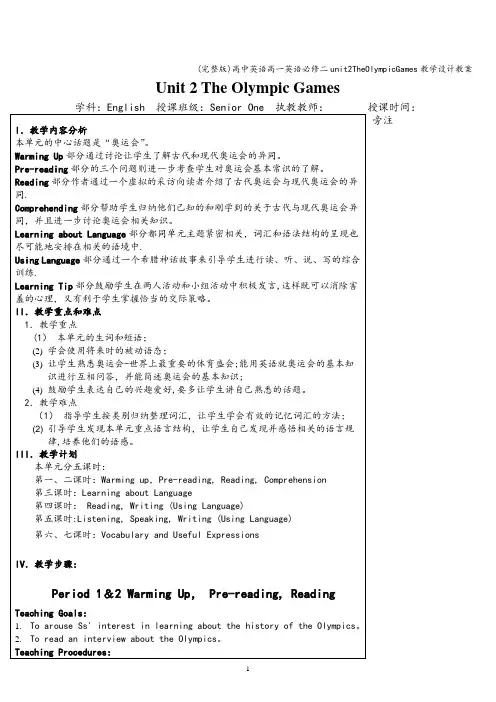
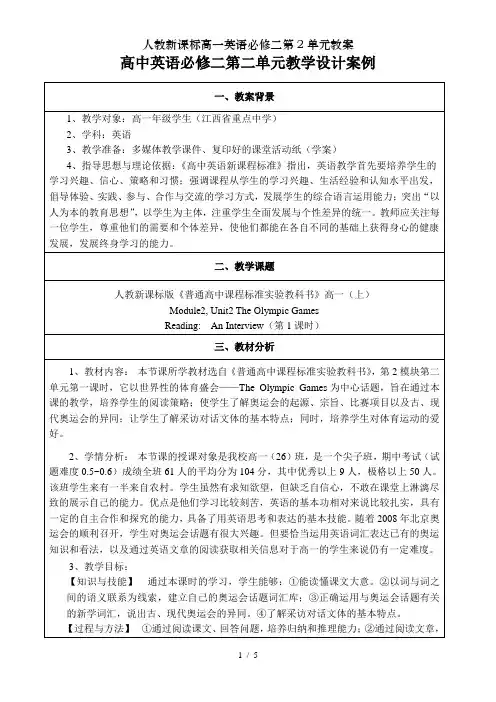
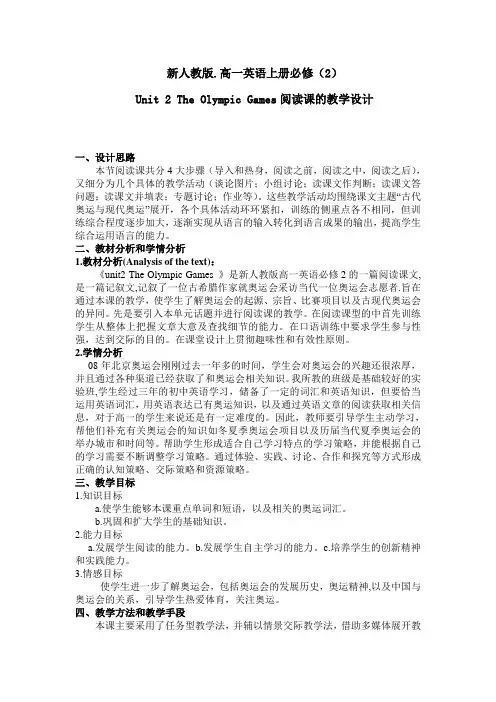
新人教版.高一英语上册必修(2)Unit 2 The Olympic Games阅读课的教学设计一、设计思路本节阅读课共分4大步骤(导入和热身,阅读之前,阅读之中,阅读之后),又细分为几个具体的教学活动(谈论图片;小组讨论;读课文作判断;读课文答问题;读课文并填表;专题讨论;作业等)。
这些教学活动均围绕课文主题“古代奥运与现代奥运”展开,各个具体活动环环紧扣,训练的侧重点各不相同,但训练综合程度逐步加大,逐渐实现从语言的输入转化到语言成果的输出,提高学生综合运用语言的能力。
二、教材分析和学情分析1.教材分析(Analysis of the text):《unit2 The Olympic Games 》是新人教版高一英语必修2的一篇阅读课文,是一篇记叙文,记叙了一位古希腊作家就奥运会采访当代一位奥运会志愿者.旨在通过本课的教学,使学生了解奥运会的起源、宗旨、比赛项目以及古现代奥运会的异同。
先是要引入本单元话题并进行阅读课的教学。
在阅读课型的中首先训练学生从整体上把握文章大意及查找细节的能力。
在口语训练中要求学生参与性强,达到交际的目的。
在课堂设计上贯彻趣味性和有效性原则。
2.学情分析08年北京奥运会刚刚过去一年多的时间,学生会对奥运会的兴趣还很浓厚,并且通过各种渠道已经获取了和奥运会相关知识。
我所教的班级是基础较好的实验班,学生经过三年的初中英语学习,储备了一定的词汇和英语知识,但要恰当运用英语词汇,用英语表达已有奥运知识,以及通过英语文章的阅读获取相关信息,对于高一的学生来说还是有一定难度的。
因此,教师要引导学生主动学习,帮他们补充有关奥运会的知识如冬夏季奥运会项目以及历届当代夏季奥运会的举办城市和时间等。
帮助学生形成适合自己学习特点的学习策略,并能根据自己的学习需要不断调整学习策略。
通过体验、实践、讨论、合作和探究等方式形成正确的认知策略、交际策略和资源策略。
三、教学目标1.知识目标a.使学生能够本课重点单词和短语,以及相关的奥运词汇。
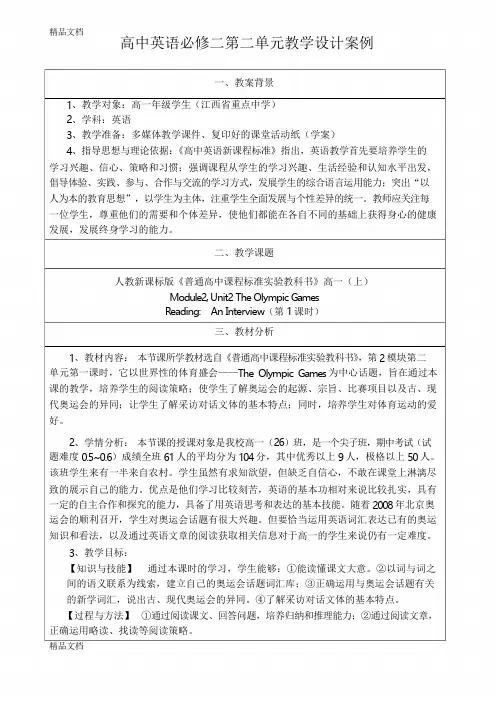
精品文档高中英语必修二第二单元教学设计案例一、教案背景1、教学对象:高一年级学生(江西省重点中学)2、学科:英语3、教学准备:多媒体教学课件、复印好的课堂活动纸(学案)4、指导思想与理论依据:《高中英语新课程标准》指出,英语教学首先要培养学生的学习兴趣、信心、策略和习惯;强调课程从学生的学习兴趣、生活经验和认知水平出发,倡导体验、实践、参与、合作与交流的学习方式,发展学生的综合语言运用能力;突出“以人为本的教育思想”,以学生为主体,注重学生全面发展与个性差异的统一。
教师应关注每一位学生,尊重他们的需要和个体差异,使他们都能在各自不同的基础上获得身心的健康发展,发展终身学习的能力。
二、教学课题人教新课标版《普通高中课程标准实验教科书》高一(上)Module2,Unit2The Olympic GamesReading:An Interview(第1课时)三、教材分析1、教材内容:本节课所学教材选自《普通高中课程标准实验教科书》,第2模块第二单元第一课时,它以世界性的体育盛会——The Olympic Games为中心话题,旨在通过本课的教学,培养学生的阅读策略;使学生了解奥运会的起源、宗旨、比赛项目以及古、现代奥运会的异同;让学生了解采访对话文体的基本特点;同时,培养学生对体育运动的爱好。
2、学情分析:本节课的授课对象是我校高一(26)班,是一个尖子班,期中考试(试题难度0.5~0.6)成绩全班61人的平均分为104分,其中优秀以上9人,极格以上50人。
该班学生来有一半来自农村。
学生虽然有求知欲望,但缺乏自信心,不敢在课堂上淋漓尽致的展示自己的能力。
优点是他们学习比较刻苦,英语的基本功相对来说比较扎实,具有一定的自主合作和探究的能力,具备了用英语思考和表达的基本技能。
随着2008年北京奥运会的顺利召开,学生对奥运会话题有很大兴趣。
但要恰当运用英语词汇表达已有的奥运知识和看法,以及通过英语文章的阅读获取相关信息对于高一的学生来说仍有一定难度。
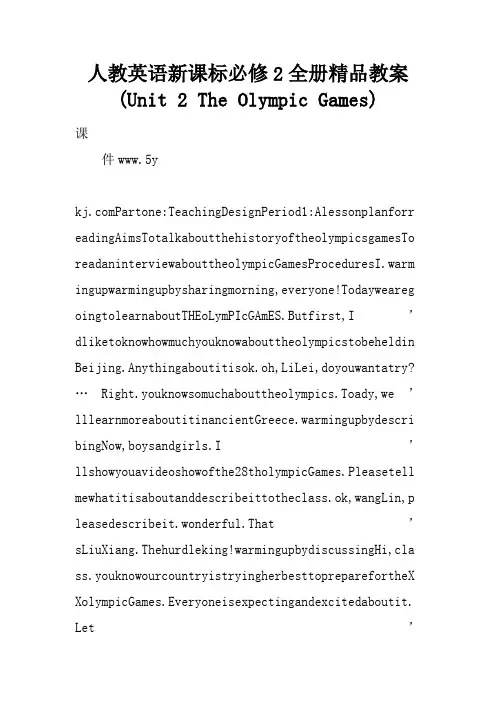
人教英语新课标必修2全册精品教案(Unit 2 The Olympic Games)课件www.5yPartone:TeachingDesignPeriod1:Alessonplanforr eadingAimsTotalkaboutthehistoryoftheolympicsgamesTo readaninterviewabouttheolympicGamesProceduresI.warm ingupwarmingupbysharingmorning,everyone!Todayweareg oingtolearnaboutTHEoLymPIcGAmES.Butfirst,I’dliketoknowhowmuchyouknowabouttheolympicstobeheldin Beijing.Anythingaboutitisok.oh,LiLei,doyouwantatry?…Right.youknowsomuchabouttheolympics.Toady,we’lllearnmoreaboutitinancientGreece.warmingupbydescri bingNow,boysandgirls.I’llshowyouavideoshowofthe28tholympicGames.Pleasetell mewhatitisaboutanddescribeittotheclass.ok,wangLin,p leasedescribeit.wonderful.That’sLiuXiang.Thehurdleking!warmingupbydiscussingHi,cla ss.youknowourcountryistryingherbesttopreparefortheX XolympicGames.Everyoneisexpectingandexcitedaboutit. Let’sdiscusswhatwecandoforit.Andimaginewhatwewilldoatth eXXolympics.II.Pre-reading1.AskingandansweringNow,p leasereadthethreequestionsbeforetheReading.Let’sdoitinturn.Let’sbeginfromthefirstrowhere…ok,youdidagoodjob.Let’ssummarizeyouranswers.Forreference:1.InSummerolympi cs,therearerunning,swimming,shooting,wrestling,jump ing,football,basketball,volleyball,tabletennis,thro wing,javelin,weightlifting,gymnastics,boxingetc.Inw interolympics,thereareskiingskating,icehockey,skiju mping,sledding,snowboardingetc.2.The29tholympicGame swillbeheldinBeijingonAuguster18th,XX.3.Toholdtheol ympicGamesisarichprizeforacountry.Anditcanmakeacoun tryknownintheworld.Itcanstimulatethecountry’seconomy,andhelptospeedupitsdevelopment.2.Imagingan dintroducingPleaselookatthethreepicturesinthereadin g.Pleasetalkaboutthem.Imaginewhateveryoucan.Forrefe rence:ThefirstpictureisthestatusofagreatGreek.Hisna meisPausanias.Hewasafamoustravelerandwriterinthesec ondcenturyAD.HisGuidetoGreeceisanextremelycomprehen siveguidebookfortourists,concentratingonbuildings,t ombsandstatusandincludingalotofinformationonthemythological,religiousandhistoricalbackgroundtothemonum entsdescribed.Itissoinformativethatitmaybecalledthe foundationofclassicalarchaeologyandthisancientBaede kerisstillusedasaguidetoclassicalGreece.canyouremem berafamousancientchinesetravelerandwriter?Healsowro teabook.yes,hisnameisXuShake.HisworksisTheNotesofXu Shake’stravels.Thesecondpictureistheopeningceremonyoftheo lympicGames.maybethisistheprinciplestadium.It’slargeandcanholdthousandsofaudience.Thethirdpicture isachineseathletenamedyangyang.Shewonagoldmedalforc hinaintheXXwinterolympicGames.Sheisafamousskatingpl ayer.3.TalkingandSharingweknowtherearemanydifferenc esandsimilaritiesabouttheancientandmodernolympics.D oyouknowanythingaboutthem?youcansimplyguess.yes,Luc y,try…III.Reading1.Readingaloudtotherecordingandfindingth egeneralideaNowpleaselistenandreadaloudtotherecordi ngofthetextANINTERVIEw.Payattentiontothepronunciati onandintonationaswellasthepauseswithineachsentence. Thentrytogetthegeneralideaofthepassage.Haveyougotth emainidea?yes,ittellsusthedifferencesandthesimilaritiesbetweentheancientandmodernolympics.2.Readingand actingNowlet’splaythepartsoftheGreekwriterPausaniasandthechinese girlLiLi.Nowboys,youarePausanias;girls,youareLiLi.P leasepayattentiontotheboldwords.3.Readingandfinding Nowreadthetextagain.Theboysshalltrytofinishthetask: whatwastheancientolympicslike?Thegirlsshalltrytofin ishthetask:whatisthemodernolympicslike?4.Readingand collectinginformationok,nowlet’sreaditsilently.Firstlet’stalkaboutthesamepointsbetweentheancientandmodernol ympics.whocananswer?Anyvolunteers?Thenlet’scometothedifferences.Thesimilarities①Bothareheldeveryfouryears.②Bothareheldnotformoneybutforhonour.③Thebeliefsarethesame.Theyare:Swifter,Higher,andstro nger.④menareallowedtotakepartbothinancientandmodernolympi cs.⑤Someeventsarethesame,suchasrunning,jumping,shooting andthowing.TheDifferences①Therewerenotwinterolympicsinthepast.②Nowcompetitorsarefromallovertheworld.Butintheancien ttime,onlythepeopleinGreececouldtakepart.③onlymenwereallowedtotakepartinthepast,nowwomanareal soallowed.④Inthepast,winnersgottheolivewreathastheprize.Nowcom petitorscompeteformedals.⑤Theeventsandathletesinmoderntimearemorethanthoseint hepast.⑥Thereisaspecialvillageforthecompetitorstolivein,ast adiumforcompetitions,agymnasiumforthesewhowatchtheg amesnow.Buttherewerenotinthepast.)5.Readingandunder liningNextyouaretoreadandunderlinealltheusefulexpre ssionsorcollocationsinthepassage.copythemtoyournotebookafterclassashomework.collocationsfromANINTERVIE wtakepartin…,goldmedals,thespiritof…,beheld,inord erto,hosttheolympicGames,onamagicaljourney,findout, thepresentdayolympicGames,usedto,writeabout…,comet oyourtime,beadmittedas…,twosetsof…,enjoycompeting in…,competeagainst…,forthehonourof…,reachthestan dard,beadmittedto…,playaveryimportantrole,aswellas ,astadiumforcompetitions,asamatteroffact,competefor …,olivewreath,feelproudof…,make…happyⅣclosingdownclosingdownbydoingexerciseToendthelesson youaretodothecomprehendingexercises1&2.closingd ownbydiscussingyouknowourgovernmenthastrieditsbestt ocompeteforhostingthe29tholympicGames.Ithascostalot ofmoney.Doyouthinkitisworthwhile?why?Forreference:I tisworthwhiletohosttheolympicGames.TohostolympicGam escanmakeourcountryknowntothewholeworld.Tohostolymp icGamescanmakeourcultureandpeopleunderstoodbytheoth erpeoples.TohostolympicGamescanstimulatethedevelopi ngofoureconomy.closingbyimaginingImaginewhatwewilld oandwhatwecandoforthe29tholympicGamesnow.Forreferen ce:maybewecanserveasvolunteerstohelptheforeignvisit orsandathletesfromallovertheworld.Soatpresentweshouldstudyhard.EspeciallyweshouldtryourbesttolearnEngl ishwell.closingdownbynarratingwecanseethetextiswrit teninaconversationalstyle.Andtherearetwospeakers.on eisPausanias,aGreekwriterXXyearsago,theotherisLiLi, achinesegirl.Nowlet’schangeitintoanarrativestyle.Inotherwords,let’sdescribetheancientandmodernolympicGamesinourownwor ds.whowouldliketohaveatry?Forreference:Theancientol ympicGamesbeganinGreeceandwereheldfrom776B.c.toA.D. 393.Itwasheldeveryfouryears.Atthattime,therewerenot somanysportsastoday.Andwomenwerenotallowedtotakepar tinthegames.Therewerenotwinterolympicsatthattime.wi nnersgottheolivewreathastheprize.Themottowasswifter ,higherandstronger.ThemodernolympicGamesbeganin1891 .They’reheldeveryfouryears.Therearemanynewsportsintheolym pics.Inthesummerolympicsthereareover250differentspo rts.womenarenotonlyallowedtojoininbutalsoplayaveryi mportantrole.Nowthecompetitorscompeteformedals.Them ottoisswifter,higherandstronger.closingdownbysummar izingAswehavefinishedthepassagewe’llsumupwhatwehavelearned.Firstlet’sseethewritingskills.Itiswritteninaconversationalst yle.It’sinaveryinterestingway.ItadoptsadialoguebetweenPaus aniaswholivedXXyearsagoandachinesegirdinmodernworld .Throughtheirdialogue,thedifferencesandsimilarities betweentheancientandmodernolympicGamesaremadeknownt othereaders.justbecauseitisinaconversationalstyle,t herearequiteafeworalspokenEnglishandellipticalphras es.Throughthecomparisonbetweentheancientandmodernol ympicGames,wehavelearnedthedifferencesandthesimilar itiesbetweenthem.Nowwecanhaveadeepunderstandingofth eGames.Fromthepassage,wecanhaveadeepunderstandingof theGames.Fromthepassage,wecanalsogettoknowthattheol ympicGamesaredevelopingandimproving.It’sourdutytomaketheolympicGamesbetterandhealthier.wek nowthatoneoftheslogansforXXBeijingolympicGamesisGre enolympicGames.Itshowsthatpeoplearepayingmoreandmor eattentiontoourenvironment.Period2:AlessonplanforLe arningaboutLanguageAims:TolearnaboutfuturepassivevoiceTodiscoverusefulwords andexpressionsTolearnthemethodsofwordsformationProc eduresI.warmingupwarmingupbydictatingThereareseveralimportantsentencesinthisunit.Let’sdictatethem.Ifyoucan’t,learnthembyheartafterclass.①whenandwherewillthenextolympicGamesbeheld?②Iliveinwhatyoucall“AncientGreece”and/usedtowriteabouttheolympicGamesmorethanXXyearsa go.③Allcountriescantakepartiftheyreachthestandardtobead mittedtothegames.④ThenextolympicGameswillbeheldinmyhometown.⑤Itisjustasmuchacompetitionamongcountriestohosttheol ympicsastowinanolympicmedal.warmingupbydiscoveringu sefulwordsandexpressionsTurntopage11anddoexercises1 ,2,3and5first.checkyouranswersagainstyourclassmates ’.II.Learningaboutwordformation1.Doexercise4anddis covertherules.Turntopage12andfindouttherulesofwordf ormation.Byadding-ingtoaverb,wecanchangetheverbinto anoun.Thatmeanswecanchange“doingsomesport”into “thenameofthesport”.Byadding-ertoaverb,wecanchang etheverbintoanoun.Thatmeanswecanchange“doingsomesport”into “thepersonwhodoesthesport”.2.meansofword-formatio ningeneralAffixation,conversion,andcompositionareth echiefmeansofword-formationinEnglish.Besidesthese,t herearealsootherminorwaysofword-formationincludingc lipping,acronymy,blendingetc.III.LearningaboutPrese ntFuturePassiveVoiceTurntopage13anddoexercise3.Andt elltheclasstheformationofpresentfuturepassivevoice. Forreference:welldone,class.wecanfollowthefollowing formlationtoturnthefuturetensesintofuturepassivevoi ce;begoingtobedone,beabouttobedone,betobedone,will/ shallbedone,would/shouldbedone.Ⅳclosingdownbysummarizing1.Presentfuturepassivevoice AffirmativeNegativeInterrogativeIyouHe/she/itwill beaskedwewillyou/TheywillIyouHe/she/itwillnotbeaskedwewillnotyou/TheywillnotwillIwillyouwillhe/s he/itbeaskedwillwewillyou/they2.ThepassiveVoiceofphrasal verbGenerallyspeaking,onlytransitiveverbscanformthe passivevoice,foronlytransitiveverbscanbefollowedbyobjects.Butmanyintransitiveverbstogetherwithsomeprep ositionsandadverbscanbeusedastransitiveverbs.Sothey canalsobefollowedbytheobjects.Thereforetheycanalsob eusedinpassivevoice.Butnotethatallthephrasalverbsar eusedasawhole.whenusingtheminpassivevoice,wecannotd ropouttheprepositionsandadverbs.Forexamples:Atlastt heyputoutthefire.Atlastthefirewasputout.Theywillputupanoticeonthewal l.Anoticewillbeputuponthewall.Haveyousentforadoctor?Hasthedoctorbeensentfor?Ihaveneverheardofsuchathing before.Suchathinghasneverbeenheardofbefore.wemusttakegoodc areofthechildrenhere.Thechildrenmustbetakengoodcareofhere.Hisclassmatesl aughedathimforthefoolishmistake.Hewaslaughedatforthefoolishmistakebyhisclassmates.P eriod3:AlessonplanforusinglanguageAims:Toreadaboutt heancientolympicGamesTolistenandtalkabouthobbiesTow riteabouthobbiesProcedures1.warmingupwarmingupbyint roducingHi!class.youknowGreeceistheworld-knowncount rywithanancientcivilization.Ithasalonghistorywithso muchmarvelousculture.TheGreekshadwonderfulstoriesab outtheGodsandGoddnesseswhowerepartoftheirreligion.T heybelievedthatthesegodorgoddesseswouldhelphumansif theyfeltsorryforthemorifthehumansweregoodpeople.How ever,theGodsdidnotalwayshelp.Theybehavedlikepeoplew howereunpredictableandcapricious.Totrytogetthesuppo rtoftheGodspeoplehadtopraytothemandofferthempresent .InthisstorytheGoddessHera,thewifeofthechiefGod,Zeu swassorryforHippomenesandagreedtohelphim.warmingupb ysharingNow,boysandgirls.Isthereanybodywhocantellus someGreekmythology.youknowtheyaresofamousinhumanhis tory.orcanyouspeakoutsomenamesofGreekGodsandGoddess es.Prometeus普罗米修斯——asonoftheformerchiefGodSphinx斯芬克斯——abeingwithahumanfacebutalionbodyPandora潘多拉——abeautifulgirlwitheveryillandevilthoughtanddeedZeus宙斯——thechiefGodwhogovernedtheworldHera天后——thewifeofZeuswhogovernedtheloveⅡ.Guidedreading1.ReadingandjudgingReadthetextTHEST oRyoFATLANTA,andcompletetheTrueorFalseguestionsafte rthetextonpage14.2.ReadingandansweringReadthetextag ain,andanswerthefollowingquestions.A.whatwasAtlanta’sproblem?B.whatwereAtlanta’srules?c.whatwasHippomenes’amazement?D.whatmadeHippomeneschangehismind?E.whomd idHippomenesturntoforhelp?F.canyouguesswhatwastheen ding?Forreference:A.Atlantacouldrunfasterthananymen inGreece.ButshewasnotallowedtorunintheolympicGames. B.Shepromisedtobemarriedtoamanwhocouldrunfasterthan her.Ifhecouldnotrunasfastasher,hewouldbekilled.c.Hi pppomenescouldnotunderstandwhysomanyyoungmenwantedt orisktheirlives.D.Atlanta’sbeautymadehimunderstandhisamazementandchangehismin d.E.HeturnedtotheGoddessofloveforhelp.F.Hippomenesw askilledbecauseoflosinghisrace.G.HeranfasterthanAtl antaandmarriedher.3.ReadingandunderliningNextyouare toreadandunderlinealltheusefulexpressionsorcollocat ionsinthepassage.copythemtoyournotebookafterclassashomework.collocationsfromTHESToRyoFATLANAbeallowedt o,runagainst…,willbepardoned,hearof…,beamazed,asf astas…,changeone’smind,ask…forhelpfrom…,promiseto,willberelaxed,pickup,beconf identabout…,shareone’spain,runpast…,competewith…,cheaptomarry4.Listeni ngForlisteningturntopage15andbereadytodoexercises1. Firstreadthequestionscarefullyandimaginewhatistheli steningabout.whendoingexercise2,youmustmakeclearwha tiswrongwiththesentence.Andtelltheclasswhichiscorre ct,whichiswrongandwhichisonlyhalftrue.5.ActingNextw earegoingtoputthetextASToRyoFATLANTAonstage.youknow therearefourcharactorsinthestory.whowouldliketobeth em?whowillbeAlanta’sfather,theoldking?whowillbetheGoddessofLove?ok.LiL i,youaretheGreekprincess.ZhangQiang,youarethebravey oungmanHippomenes.Lucy,youaretheGoddessofLove.ZhouG ang,youaretheprincess’sfather.Therestofclass,pleaseprepareitingroupsoffou r.Thenactyourplaybeforeclass.AtextplayofTHESToRyoFA TIANTATime:onemorninginspringPlace:atthepalacePeopl e:theoldking,theprincess,theyoungman,theGoddessoflove.F:mydeardaughter,youseehowbeautifulthespringis!youare justlikethespringflowers.whydon’tyoumarry?Somanyyoungkingsandprincesswanttomarryyou ,andtheyareallsorich,smartandnice.A:oh,dearfather.IhavepromisedthatIwillonlybemarriedto amanwhocanrunfasterthanme.Iwillrunagainsthim.Ifheca nnotrunasfastasme,hewillbekilled.Noonewillbepardone d.F:But,mydeardaughter.Nomanhaswonyou.Theyallsentthemse lvestodeath.whenwillyougetmarried?A:Iwon’tmarryunlessIamallowedtorunintheolympicGames.H: oh,mykindestkingandmyprettiestprincess!I’llmarrytheprincess.I’llcompetewithyou.A:Doyouknowtherules?H:yes,princess!F:oh,youngman!Goaway!youcan’twinher.youareonlylosingyourlife!H:No,Iwantatry!F:Foolishthing!Goaway!Don’tgotodie!L:oh,youngman,what’sthematter?whyareyousosad?H:oh,myGoddess,canyouhelpme?canyouhelpmetowintheprinc essandmarryher?L:ok,youngman.Doyoureallywanttomarryherandloveher?H: ofcourse.Sheissobeautiful.L:ok,itiseasy.Takethesethreegoldenapples.ThrowapplesinfrontofAtlantawhensheisrunningpastands hewillberelaxed.whenshestopstopickitup,youwillbeabl etorunonandwin.H:oh,thankyou,myGoddess!k:well,youngman,whyareyouhereagain?H:mykindestking.Iwanttomarryherandrunagainsther!k: well,youngman.Irepeat.Don’tbesilly!Goaway!H:No.Iloveher.Iwillmarryher-ordie!6.SpeakingNow,class.Let’scarryoutasurveyoftheinterestsintheclassandwritedownthenamesoftheclassmateswhohavethesameinterests.you cancarryoutthetasklikethis.whichdoyoulike,sport,musicorcollection?whichofthesportsdoyoulikebest?whatisyourfavoritesport?Areyouinterestedintabletennis?Afterthesurvey,theoneswhohavethesameinterestssittog etherandpleaseworkingroupsoffourtotalkabouttheirint erest.whydoyoulikethissport/music/collection?whendo youbegintolikeit?what’senjoyableaboutthehobby?whathaveyoulearnedfromtheho bby?III.Guidedwriting1.writinganimagineddialogueGro ups1and2aregoingtowriteanimagineddialoguebetweenthe princessandHippomenes.youmaybeginlikethis:oh,mydear princess,Iwanttomarryyou…2.writingadescriptionTurntopage16andfollowthedirect iontowriteadescriptionofyourfavoritehobby.Hereisane xample:Swimmingismyfavoritesport.Ilikeitbecauseitca nbringmemuchfun.Theprocessoflearningswimmingisveryi nteresting.youcantrydifferentwaysofswimming,suchasb reaststrokeandbackstroke.youcanswimatanytimeoftheyearifyoulike.Inhotsummer,ifyoujumpintotheriverorthes eatohaveaswim,you’llfeelcoolandcomfortable.Evenincoldwinter,youcanswi mifyouarebraveenough.It’sahealthysportanditcanbuildupyourbody.Ifyouareabegi nner,youmustbecareful.you’llbetternotswimaloneandbringlifebuoywithyouincaseof danger.Ifyouwanttobeagoodswimmer,youmusthavealotofp racticeandhavegreatdetermination.IV.closingdownbyfi ndinginformationGotothelibrarytoreadorgetonlinetose archinordertofindmoreinformationontheolympicGamesan dtheancientGreekmythology.Takenotesofyourfindingand reporttoyourgroupmatesnextmondaymorning.PartTwTeach ingResourcesSection1:ThewritingstyleofthereadingANI NTERVIEwTypeofwritingconversationalstylemainideacom paringthedifferencesbetweenAncientandmodernolympics characteristicsBycomparingandcontrastingSection2:Ba ckgroundinformationontheolympicGamesI.Eventsofthemo denolympicGamesArchery,Baseball,Badminton,Basketbal l,Beach,Volleyball,Boxing,canoe/kayak,cycling,Divin g,Equestrian,Fencing,FieldHockey,Gymnastics,Handbal l,judo,modernPentathlon,Rowing,Sailing,Shooting,Soccer,Softball,Swimming,SynchronizedSwimming,TableTen nis,Tennis,Taekwondo,Track&Field,Triathlon,Voll eyball,waterPolo,weightlifting,wrestlingII.olympicT raditionsTheolympicAnthemTheolympicanthemwaswrittenbytheGreeknationalpoetcos tisPalamasandcomposedbyGreekmusicianSplrosSamaras.I twasfirstsungatthe1896Games.TheIocadopteditastheoff icialolympicanthemtocrownolympicceremoniesatthe1958 IocSessioninTokyo.TheolympicmottoTheolympicmotto“swifter,higher,stronger”comesfromthreeLatinwords”citus,altius,fortius”,whichactuallymean”faster,higher,braver”.TheFrencheducator,BaronRerre decoubertin,whorevivedtheancientolympicGamesandin18 96ledthefirstmodern01ympicGamesinAthens,borrowedthe phrasefromaDominicanpriestHenriDinon.mr.Dinonintrod ucedthesewordswhilepresentingathleticprizesatacolle gein1891.Buthowdidthesewordsbecomethemottooftheolym picGames?ItwasmichelBrealwhointroducedthisphraseatt heclosingdinnerofthecongressforthereestablishmentof themodernolympicGamesonjune23,ter,theInternationalolympiccommitteeformallyadoptedthisphraseasth eofficialmottooftheGames.TheolympiccreedTheolympiccreedwasalsointroducedatthe1896Games.Asst atedbyPierredecoubertin,thecreedisasfollows:”ThemostimportantthingintheolympicGamesisnottowinbut totakepart,justasthemostimportantthinginlifeisnotth etriumphbutthestruggle.Theessentialthingisnottohave conqueredbuttohavefoughtwell.”TheolympicFlagItwasPierredecoubertinwhoconceivedthe ideaoftheolympicflagwithfivecolouredinterlockingrin gsonawhitebackround.Theringsrepresenttheunionofthef ivecontinentsandthemeetingoftheathletesfromallaroun dtheworldattheolympicGames.Today,almostacenturyaftertheflag’screation,thesixcolours,thoseoftheringsandthatofthe whitebackgroundwhichstandsforpeace,stillmaintainthe irsymbolismandcanbefoundinflagsacrosstheworld.Theol ympicflagwasfirstusedduringtheAntwerpGamesin1920.Th eolympicoath“Inthenameofallthecompetitors,IpromisethatweshalltakepartintheseolympicGames,respectingandabidingbyth eruleswhichgovernthem,inthetruespiritofsportsmanshi p,forthegloryofsportandthehonourofourteams.”AttheopeningceremonyofeachGames,oneathletefromtheho stcountrytakesolympicoathonbehalfofallcompetingathl etes.Thisparticulargestureofsports-manshipwasintrod ucedatthe1920GamesinAntwerp,Belgium.Acoachorteamoff icialtakesasimilaroathateachopeningceremony.Theolym picFlameTheolympicflameisoneofthemostvisiblesymbols ofthemodernGames.ItstraditionhassurvivedfromtheGame sofancientGreece,whereasacredflame,ignitedbythesun, burnedcontinuallyonthealtarofthegoddessHera.Themode rnolympicflamewasfirstlitin1928attheAmsterdamolympi cGames,whereitburnedthroughoutthecompetitions.Ithas becomeamajorsymbolforsolidarityamongnationsandembod iestheolympicspiritencompassingtheidealsofpurity,th eendeavourforperfection,thestruggleforvictory,frien dshipandpeace.TheTorchRelayDuringthe1896GamesinAthe ns,younginspiredsportsmenhadorganisedthefirsttorchr elays.However,thetraditionoftheolympictorchofficial lybeganattheBerlinGamesin1936.Asinancienttimes,thetorchislitbythesuninAncientolympia,thenpassedfromrun nertorunnerinarelaytothehostcity,whereitisusedtolig httheolympicStadium’sflameduringtheGames’openingceremony.Theflamethenburnsuntilitisextinguis hedattheclosingceremony.Section3:wordsandexpression sfromunit2THEoLymPIcGAmEShonestadj..notdisposedtocheatordefraud;notdeceptiveorfrau dulent:honestlawyers2.markedbytruth:givehonestanswe rs3.withoutpretensions:workedatanhonesttrade4.without dissimulation;frank:myhonestopinion5.habituallyspea kingthetruth:anhonestman6.worthyofbeingdependedon:anhonestworkingstaff7.freefromguile:Hisanswerwassimpleandhonestancienta dj..veryold:anancientmariner2.inoroftimeslongaganc ientRomeandGreece3.havingexistedsinceaveryearlytime :ancienthistory/customscompetev.totrytowinsth.incompetitionwithsomeoneelse:johncompetedforaplaceattheirschool,butdidn’tgetit.competeforsomething;engageinacontest;measureoneself againstothersmedaln.anawardforwinningachampionshiporcommemoratingsomeot hereventhostn.amanwhoreceivesguests:Heactedashostto hisfather’sfriends.chinaisthehostcountryforXXolympicGames.v.bethehostoforfor:wehosted4coupleslastnight.magicala dj.possessingorusingorcharacteristicoforappropriatetos upernaturalpowers:amagicalspellinterviewn..thequestioningofaperson;oftenconductedbyjourna lists:myinterviewswithteen-agersrevealedaweakeningo freligiousbonds.2.aconferencev..conductaninterviewintelevision,newspaper,andra dioreporting2.discussformallywithforthepurposeofane valuation:weinterviewedthejobcandidates.3.goforanin terviewinthehopeofbeinghired:Thejobcandidateinterviewedeverywhere.athleten.apersontrainedtocompeteinsportsadmitv..allowparticipationinortherighttobepartof;permi ttoexercisetherights,functions,andresponsibilitieso f:admitsomeonetotheprofession2.allowtoenter;grantentrytwecannotadmitnon-membersint oourclub.3.serveasameansofentrance:Thisticketwillad mitoneadulttotheshow.4.giveaccessorentrancetTheFren chdoorsadmitontotheyard.5.affordpossibilitye:Thispr oblemadmitsofnosolution.6.declaretobetrueoradmitthe existenceorrealityortruthof:Headmittedhiserrors.7.a dmitintoagrouporcommunity:we’llhavetovoteonwhetherornottoadmitanewmember.8.haver oomfor;holdwithoutcrowding:Thetheateradmits300peopl e.replacev..putsomethingbackwhereitbelongs:Replacethebooko ntheshelfafteryouhavefinishedreadingit.2.substitute apersonorthingfor:Hereplacedtheoldrazorblade.3.putintheplaceofanother;switchseeminglyequivalenti tems:TheconartistreplacedtheoriginalwithafakeRembrandt.4.taketheplaceormoveintothepositionof:Smithrepl acedmillerascEoaftermillerleft.relatev..haveorestablisharelationshiptSherelateswelltoh erpeers.2.beinarelationshipwith:Howarethesetwoobser vationsrelated?3.giveanaccountof:Thewitnessrelatedt heevents.4.havetodowithorberelevantto5.makealogicalorcausalconnection:Icannotrelatethese eventsatall.sailn..alargepieceoffabricbymeansofwhichwindisusedtop ropelasailingvessel2.anoceantriptakenforpleasure v..traverseortravelbyshipon:wesailedtheAtlantic2. travelinaboatpropelledbywind:Ilovesailing,especiall yontheopensea.3.travelbyboatonaboatpropelledbywindo rbyothermeans:TheQE2willsailtoSouthamptontomorrow.4 .movewithsweeping,effortless,glidingmotions:Shredso fpapersailedthroughtheair.advertisev..callattentiontPleasedon’tadvertisethefactthathehasAIDS.2.makepublicityfor;t rytosellpromisen..groundsforfeelinghopefulaboutthefuture:Thereislittleornopromisethathewillrecover.2.averbalcommitm entbyonepersontoanotheragreeingtodosomethinginthefu turev..givegroundsforexpectations:Theresultspromisedf ameandglory.2.makeapromiseorcommitment3.promisetoun dertakeorgive:Ipromiseyoumybesteffort.4.makeapredic tionabout;tellinadvance课件www.5y。
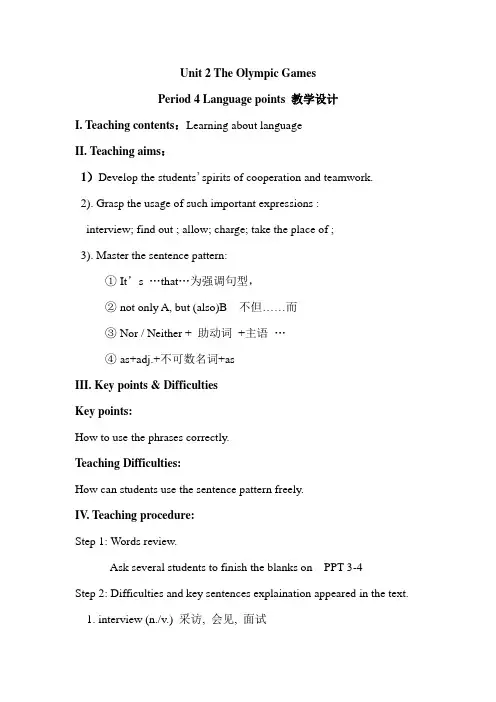
Unit 2 The Olympic GamesPeriod 4 Language points 教学设计I. Teaching contents:Learning about languageII. Teaching aims:1)Develop the students’ spirits of cooperation and teamwork.2). Grasp the usage of such important expressions :interview; find out ; allow; charge; take the place of ;3). Master the sentence pattern:①It’s …that…为强调句型,②not only A, but (also)B 不但……而③Nor / Neither + 助动词+主语…④as+adj.+不可数名词+asIII. Key points & DifficultiesKey points:How to use the phrases correctly.Teaching Difficulties:How can students use the sentence pattern freely.IV. Teaching procedure:Step 1: Words review.Ask several students to finish the blanks on PPT 3-4Step 2: Difficulties and key sentences explaination appeared in the text.1. interview (n./v.) 采访, 会见, 面试interviewer (采访者)interviewee (被采访者)2. find out 查明,弄清情况find sb. out 查处(坏人);识破3. It+be +被强调部分+that/who+句子其余部分。
高一英语必修二unit2教案高一英语必修二unit2教案已经为大家准备好啦,老师们,大家可以参考以下教案内容,整理好自己的授课思路哦!本单元的话题是讲有关奥运会的知识及体育运动。
第一课时首先是要引入本单元话题并进行阅读课的教学。
在阅读课型的第一课时中首先训练学生从整体上把握文章大意及查找细节的能力。
第二课时处理语言点及深层次理解文章。
在口语训练中要求学生参与性强,达到交际的目的。
在课堂设计上贯彻趣味性原则。
让学生认识和学习世界上最重要的一个体育盛会--奥运会。
使学生达到能用英语就奥运会的基本知识进行互相问答,并能简述奥运会的基本知识。
1、培养自主学习的能力和开展研究性学习2、训练口头表达及阅读能力1、就奥运会话题进行小组互动、商讨2、阅读文章把握文章大意在学习新课之前已布置学生完成本单元话题任务:选择一:假设自己接到一个任务当2008年奥运会的策划者,要求设计这场奥运会。
内容包括确定运动项目、会歌、会旗、等与奥运会有关的内容。
要求学生用英文以教案或手抄报的方式在课上展示自己的设计成果。
选择二:模仿开心词典的形式,用英语设计一些关于奥运会的问题考你的同学。
组织形式:分小组完成。
I热身 (warming-up) 8’1、放一首雅典奥运会的会歌及一个比赛录像,再以提问的方式问学生刚刚展示的是什么内容!导入本单元话题:奥运会。
向学生提问:a. 你喜欢运动吗!你喜欢看奥运会吗!b. 你最喜欢哪个项目!c. 你知道多少有关奥运会的知识!2、出示一个小测试。
考考学生对奥运知识知多少!以问卷调查的方式让学生互相询问有关奥运的知识,把得分记下。
II 话题讨论 (Discussion) 15’1、组织学生小组之间用英文互相介绍自己的设计方案,并在课堂上展示他们的设计成果。
老师对同学的作品给予肯定。
2、根据情况补充一些与话题有关的知识。
例如:图文并茂小结所有奥运会比赛项目的英文名称。
其他表达还有:吉祥物、火炬等。
可以引入一个有关奥运会的英文小测试。
高中英语必修二Unit 2 The Olympic Games 教学设计一. 教材分析本单元的中心话题是The Olympic Games.阅读内容是一篇对话题记叙文,通过古希腊作家Pausanias到现代社会采访一位中国奥运志愿者的方式,介绍奥运会的相关知识。
如:奥运会的起源,发展,主题和一些竞赛项目,让学生了解到古代和现代奥运会的异同。
通过对该文的学习,我们不仅要学习课本上有关奥运会的知识,同时也深入了解奥运文化及其精神实质。
其目的是培养学生对体育运动的爱好,增强学生的爱国热情。
二. 学情分析三年的初中英语学习,使学生储备了一定的词汇和英语语言知识,但初中养成的一些学习习惯(如大量机械记忆单词、句型,反复复述课文等)一时还难以改正,而且对高中英语学习的策略和学习环境还很陌生,他们迫切希望获取高中英语学习方法的指导,尤其是在有效的自主学习能力培养方面的指导。
三. 教学目标教学目标(一)语言知识目标1.学习本课新词汇:ancient compete competitor medal host Greece Greek magical interview athlete admit set(n.) slave stadium gymnasium replace prize motto swift wreath replace2.学习本课新短语:take part in, a set of, as well as3.学习本课句型:1).I liv ed in what you called “Ancient G reece” and I used to write about the Olympic Game a longtime ago .2).---How often do you hold your Game?---Every four years.3). It’s in the summer Olympic that you have the running race,(二)语言技能目标1.通过上网查找等课前准备,了解奥运会的历史;2.培养学生根据课文标题预测课文内容的能力,并通过速读确认预测;3.在对奥运史有初步了解的基础上,通过细读文章进一步了解现代奥运的发展过程及现状,从而达到了解奥运历史,学习奥运精神的目的。
Unit 2 The Olympic GamesPeriod 1 Pre-class task: about vocabulary of item in the Olympic GamesStep 1 Word Game: Part 1: Each group get 4 words to guess. one points for each. Part 2: The quickest to match the word correctly can get 2 points for his/ her group, but if the answer is wrong,1 points will be lost.shot put击剑discus throw 摔跤javelin throw 悬挂式滑翔Marathon 冰球Canoeing 举重ice hockey 马拉松Weightlifting 划独木舟Wrestling 铁饼fencing 推铅球hang-gliding 标枪Part 3: The quickest to guess the word correctly can get 2 points for his/ her group, but if the answer is wrong,1 points will be lost.Rings, high bar, side hors(鞍马)e, vaulting horse(跳马), double bar, free exercisesStep 2 Warming upTalk about when ,where, and anything you know about the Olympics according to the pictures given.1. get Ss to talk about picturesTeacher can give one example2. let 2 Ss share their understanding of the pictures and act it out for the classStep 3. Speaking Activity 1 ( Warming up p17)Page 49 Now turn to page 49 and look at exx.1&21.Read through the words and fill in the form2.Work in pairs and make a simple dialogue using the information in the form by asking:•Do you know which sports are usually part of the Winter Olympics?•Which sports are played between team?•In which sports are Chinese athletes the best?3.Pairs to act it outStep 4 Speaking Activity 2Teacher help the Ss to talk about their hobbies(about sports) by teaching them some expression.1. show some useful express2.explain them if necessary.3.give some words of sports for Ss to talk with their partner.4.act it outStep 6 Homework1.Find out the fact in Warming up to the number given to you (it’ll be checked tomorrow)2.Finish Exx.1-4 on p11-123.《课程探究》Exx 1&24.Go over the new words.Period 2Step 1 Number gameHave the Ss to open the book on page 9, try to match the number to the events. The one who get the closest answer will get 1 point of the group1.show the number to the Ss2.have the Ss write down the answers by filling with the number in the table776 B. C. The ancient Olympic Games start in Greece.393 A. D. The ancient Olympic Games stop1896 The modern Olympic Games start in Greece.311&13 The numbers of competitors & countries took part in 18961932 China first joined in the Games.1984 China first got gold medal by Xuhaifeng.10.000&119 The numbers of competitors & countries joined in Sydney Olympic2004 China got the 2th place in Athens.2008 China will host the 29th Summer Olympics in Beijing.3. check and give points to the group.Step 2 Pre-readingShowing the Motto of the Beijing 2008 Olympic Games Bid (北京奥运申报口号) to the whole class.1.raise a question: “Do you know more about the Olympics history?”2.get the Ss to read about an interview to get more.3. get the Ss to make sure the relationship between Pausanias and LiliStep 3 Reading comprehensionRead the Olympic Games1.Make sure the information they have to get:The 29th Olympics The old OlympicsThe Olympic GamesThe 27th Olympics The modern Olympics1st time: Read the text quickly and find out the answers to the following Qs:1). The old Olympics: when / where / who/what to get2). The modern Olympics: how often / how many sets / who3). The 27th Olympics: when / where to live/ for the spirit of…4). The 29th Olympic: when / where/ what to get2nd time: Read the text carefully and answer the question on page 11,have the Ss:. 1.Read the passage again and find out the answers to the questions in Ex 22.Discuss the answers with your partner3.Tell the whole class the answersStep 4 Summing up1 individual work, take out a piece of paper to sum up the text2.pair work: “Close the books, talk about the Olympics with what you have learnt & your own knowledge.”3.act it outStep 5 Homework1.《英语周报》知识点练习和短文改错2.Finish Ex.1 of a table on p113.P50 Ex.2, P51 reading task4.Go over notes on page 78-79.Period 3 & 4Step 1 Homework checking & motivating1.check the homework2. talk the motto of modern Olympic Games: Swifter/faster, higher, strongerStep 2 Language points1. Ss give the phrases and expressions according to the Chinese T gives2. Ss raise Qs on some difficult points they found while reading the textReading text:1.Take part in/join in 参加2.The spirit of ……精神、宗旨、灵魂ed to 过去常常4.Find out 查明,找出5.Every four years 每四年,每隔三年6.All over the world (遍及)全世界7. A set of 一套,一组pete with/against 和……竞争pete for…为……而竞争10.be admitted to 获准做某事11.be admitted as 作为…被接受12.reach the standard 达到……水平、标准13.play an important role/part in 在……方面扮演重要角色(起重要作用)14.as well as 和……一样15.think you for your time 感谢您(能抽空……)e from the same root 同根17.Have (no) chance of doing sth. 有(没)做……的机会18.Go with 伴随,与……搭配19.relate…to…把……与关联起来20.relate with 和……有关21.Run against…和……赛跑22.Hear of 听说23.Make sure 确定24.Take turns 轮流25.One after another 一个接一个take part in参加take part in, join, join in, attend的区别take part in 指参加某种活动,如体育、比赛、游戏、讨论、战斗等,并积极地起着作用。
人教新课标版高中英语必修2 第2单元阅读课教案一、教学课型:阅读课本课的Reading An Interview是一篇对话形式的课文,围绕单元中心话题The Olympic Games而展开。
通过学习本篇课文,让学生了解对话文体的特点,训练学生概括文章主旨和寻找相关细节的能力;引导学生了解有关奥运会的信息,并体会中国成为2022年奥运会东道主的喜悦和自豪感,由此引发学生思考在奥运会到来之际,自己能为奥运做些什么。
二、教材分析1. 教学内容(见教材第9 11页内容)2. 教材处理本单元的Warming-up是围绕奥运会这一话题展开的。
笔者要求学生在课前利用网络和书籍收集与奥运会有关的信息,并补充了一些有关奥运会比赛项目的英语表达法。
把Warming-up和词汇学习等整合成一节课。
这样,原先单一的对话变成了一个完整的故事,更贴近学生的生活,也更容易被学生所理解。
笔者还重新设计了Comprehending中的表格和问题,使之更加紧扣文章的主题,更符合学生的认知特点和实际情况,以便学生更好地完成任务,体验学习成功的快乐。
3. 教学目标(1)引导学生运用阅读技巧把握课文主题,理解课文细节,并培养学生概括文章大意和口头表达的能力;(2)引导学生了解奥运会的相关知识,包括古代奥运会的由来和发展、现代奥运会的概况以及中国的奥运之路,并引导学生在阅读中思考如何使奥运精神深入人心;(3)要求学生掌握一些有关奥运的英语表达,提高学生谈论有关体育话题的语言交际能力。
4. 教学重点和难点(1)培养学生的阅读技巧,即把握文章主旨和理解课文细节的能力;(2)提高学生概括文章大意的能力;(3)激发学生的情感,提高学生表达思想的能力。
三、教学步骤设计1. 总体思路笔者在本节阅读课的教学设计中采用了多媒体教学等辅助手段,在学生阅读过程中分别安排了小组竞赛抢答、观看图片回答问题、四人小组讨论以及集体回答等多种活动,旨在启发学生的思维,使学生通过亲身体验和相互合作,在真实的交流中提高获取信息和处理信息的能力。
Module2 Unit3 ComputerReading Who Am I? 教学设计教材分析:1.教学对象分析本课的教学对象为高一的学生,学生在前一节课的词汇学习中已经掌握了文中所出现的大部分生词,为接下来的阅读扫清了障碍,能让学生更好的专注于语篇结构的理解,培养学生的语篇意识,使其更全面的理解文章内容,归纳主旨大意。
2.教学内容分析本课为人教版必修二第三单元的内容,文章以第一人称的形式按照时间的先后顺序讲述了computers 的产生、发展和现在,并以拟人化的口吻表达了computers乐于为人类服务的精神。
学生通过本课的学习,可以增加对计算机的理解并学习相关的词语,理解计算机的发展史及其广泛的应用,从而激发学生对科学探索的兴趣。
教学目标:知识与技能:1.Enable students to grasp the new words and expressions in the passage.2.To have a better understanding of the history and basic knowledge of computers.过程与方法:Predicting;Skimming and scanning;Task-based teaching and cooperative study情感、态度与价值观:1.Arouse students' great interest in learning computers and let them learn to use computers intheir daily lives2.Develop students' sense of cooperative learning教学重点和难点:Teaching important points:1.Let students learn more about history and basic knowledge of computers2.Get students to learn different reading skillsTeaching difficult points:1.Develop students' reading ability2.Enable students to learn to express their opinions教学工具:Multimedia教学过程:Step 1 GreetingsStep 2 Warming upShow students some pictures on the screen, such as an abacus, a calculator, a huge computer, a PC, a laptop, a PDA, and robot and ask Ss to name them in English.设计说明:给学生展示一些有关计算机之类的图片来导入本课内容,激发学生浓厚的学习兴趣和强烈的求知欲,为接下来的阅读材料做了准备。